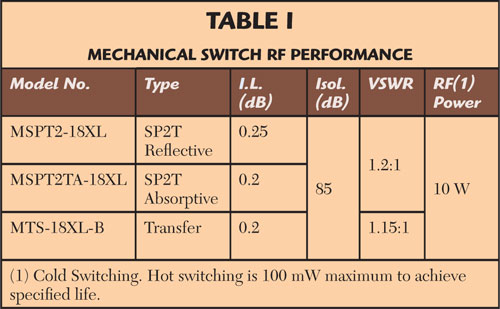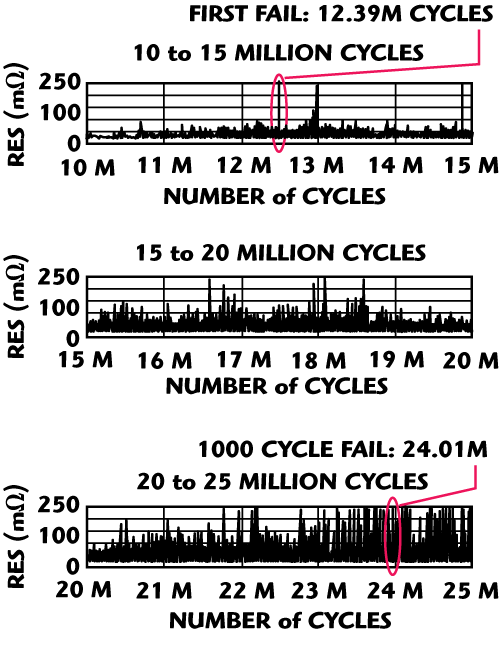 Prior to developing its mechanical switch product line, Mini-Circuits was a significant purchaser of mechanical switches for use in ATE for internal automated production test facilities. These switches were made using a combination of springs and solenoids, and most operated for less than 1 million cycles or approximately 50 days in the company’s production environment. As necessity is the mother of invention, this turnover prompted Mini-Circuits to attempt to design a mechanical switch to address the short operating life, long lead times, and high cost of using commercially available mechanical relay switches.
Prior to developing its mechanical switch product line, Mini-Circuits was a significant purchaser of mechanical switches for use in ATE for internal automated production test facilities. These switches were made using a combination of springs and solenoids, and most operated for less than 1 million cycles or approximately 50 days in the company’s production environment. As necessity is the mother of invention, this turnover prompted Mini-Circuits to attempt to design a mechanical switch to address the short operating life, long lead times, and high cost of using commercially available mechanical relay switches.
Based on experience, the design objective was to develop a long life mechanical switch. Mini-Circuits set the following criteria as a means to meet that objective:
- Replace the use of springs with magnetics
- Select combinations of materials based upon compatibility and ability to mate with limited wear
- Simplicity of design with the minimum number of components possible
- Cost effectiveness to meet internal and external market demands
RF Performance
The development effort of the Mini-Circuits mechanical RF switch has resulted in a number of patents awarded and pending on a design that is free from springs or other tension devices, using solely magnetics for contact movement. Equally important to extended life, the switch is required to meet a minimum standard of RF performance. Mini-Circuits’ mechanical RF switches are all broadband switches operating from DC to 18 GHz and meet the RF performance criteria listed in <

Qualification Testing
Over many years, Mini-Circuits designers produced many design iterations. In order to validate these designs a methodology was developed to evaluate the useful life of a mechanical relay switch, starting with defining the criteria for a “failure” of the switch.
It was commonly believed that a mechanical switch has “failed” when it fails to switch states (was closed when expected to be open, or open when expected to be closed), i.e. catastrophic failure. Mini-Circuits learned that failure of a mechanical RF switch occurs prior to catastrophic breakdown. Through testing, it was shown that a mechanical switch will actually experience many cycles of degraded performance prior to reaching final catastrophic failure. For practical purposes, in a customers’ application, the number of failed switching cycles is a more meaningful criteria for determining the “failure” of a mechanical switch. For example, many commercially available mechanical switches are specified at one-million cycle life expectancy; however, Mini-Circuits has seen that these switches often exhibit failed performance starting at 800,000 cycles. In a test environment, every failed switch cycle can mean rejecting a good DUT.
As a result, Mini-Circuits defines “Life Test Failure” as an accumulation of individual switch cycle performance failures. The pass criterion for any one performance-cycle is a closed-switch-state that measures DC resistance less than 240 milliohms, which is equivalent to an increase in RF insertion loss at low frequencies of 0.021 dB. The Mini-Circuits criterion for Mechanical Switch Life Test is that the switch must pass two sets of conditions validating both short-term and long-term failures: First 10 cumulative cycle failures occurs after 5 million total switch cycles (equals 2 DPPM) and Cumulative of 1000 cycle failures occurs after 10 million total switch cycles (see Figure 1).

Figure 1 Contact resistance vs. number of cycles.
In addition to Life Test, another critical criterion is operation in Sleep Mode. Sleep testing validates the ability of a mechanical switch to remain in a fixed state for an extended period of time, and still switch reliably to another state when energized. This parameter is a result of applications where mechanical relay switches are used to switch-in redundant paths in the event of a failure in the main path (see Figure 2).

Figure 2 Production test results: Switch 1000 cumulative switch-cycle failures.
Mini-Circuits continues to test switches in this mode of operation. Sets of switches were stored in a laboratory environment and in a fixed state over a period of four years. At specific intervals, switches were removed and tested for their ability to “switch” after the period of inactivity. All switches operated successfully the first time they were energized, including those energized after being dormant for four years.
Switch Tune-Up
Even though the life of the Mini-Circuits switches is greater than any other switch on the market today, the switches will fail at some point. However, their unique construction makes it very practical to service the switch by cleaning the contact assembly enabling switch performance recovery for extending the switch life to well over 100 million cycles. Mini-Circuits also validated the effectiveness of the “tune-up” on the mechanical switches, subjecting switches to extended life testing with “tune-ups” after any switch reached 1000 cumulative failed switch cycles. The company has achieved total switch life cycle of greater than 300 million cycles (see Table 2).

Production Life Testing
It is a Mini-Circuits internal quality requirement that each production lot of mechanical RF switches be subjected to sample life testing prior to Lot Acceptance. On each production lot, a minimum of two switches are randomly selected and subjected to the same DC life test as outlined above. All units are required to pass the First Failure and the Cumulative Failure criteria for lot acceptance. Data is recorded on all production lots; Figure 2 represents the distribution of switch cycle-count at which 1000 Cumulative Cycles occurred for each of the 75 switches.
Conclusion
Through a unique design approach, Mini-Circuits has developed and validated a new design concept for mechanical RF switches that, for all practical purposes, do not wear out and have a lifetime far exceeding switches commercially available on the market today. They have demonstrated ability to be used in excess of 300 million cycles with periodic tune-up, meeting all electrical performance as outlined in the catalog datasheet.
Mini-Circuits
Brooklyn, NY (718) 934-7092
www.minicircuits.com
RS No. 300
